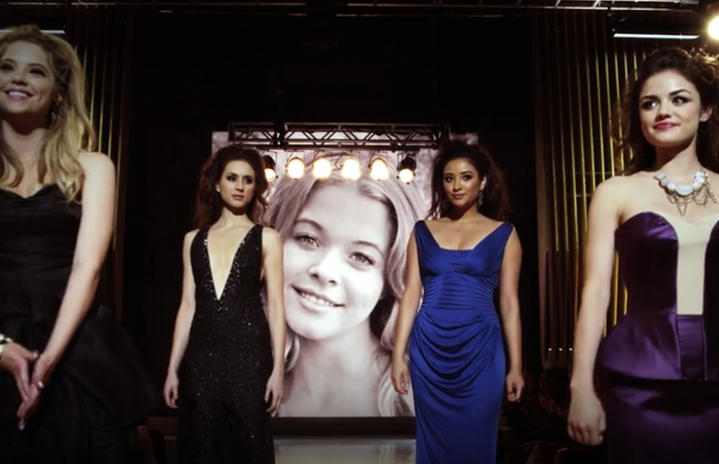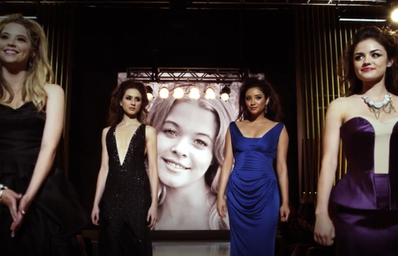As the seasons change and the leaves turn orange with time, many of us find ourselves revisiting TV shows from our childhood. The show that’s been revived this time? Pretty Little Liars. Based on the book series by Sara Shepard, Pretty Little Liars is a popular mystery-drama show that follows four high school friends—Aria, Spencer, Hanna, and Emily—as their lives are turned upside down after their best friend Alison goes missing. A year later, the group begins receiving unsettling messages from an unknown number known as “A”, who appears to know all of their secrets, ones they had only told Alison, which “A” will not hesitate to reveal.
As they search for answers, the friends find themselves in a constant web of secrets, coping with family issues, romantic conflict, and the continual possibility of their secrets being revealed. Every time we think a character can’t lie anymore, they dig themselves a new hole for “A” to throw them in. From 2010 to 2017, the show was praised for its twists, turns, and insane “A” reveals, but it also brought light to certain inappropriate relationships, particularly between teenage girls and adult men, that were seen as completely normal when the show aired. As we all begin to rewatch PLL this autumn, we start to see Ezra Fitz and many others for what they really are: creepy, weird groomers.
THE SAD STORY OF ARIA MONTGOMERY
When we first meet Aria Montgomery, she has just returned from her father’s one-year sabbatical in Iceland. This, for many other PLL fans and me, is Icelandic Aria. With her soft complexion, dark brown hair and bohemian style, she is introduced as the artsy, introspective member of the group. Aria is noticeably mature for her age, with a strong interest in literature, music, and creativity, distinguishing her as the group’s more intellectual, contemplative figure. She was set out to be the main character of PLL… I wonder what happened?
Aria Montgomery’s life is devastatingly and dramatically ruined by her connection with Ezra Fitz, her high school English teacher, a plotline that has been widely scrutinised over the years. When Aria (16) and Ezra (22) first meet, they are drawn to one another’s brains and hobbies, developing a bond that quickly turns into love despite their 6-year age gap. However, the relationship crosses multiple ethical lines because Ezra is not only much older than Aria, but he also holds a position of power over her as he is a teacher and a person of authority in her life. This dynamic makes Aria vulnerable, and her relationship with Ezra causes her to keep secrets from her friends and family, destroying her confidence in those closest to her. Her life centres around Ezra. Scenes of Aria include her in Ezra’s apartment, or Ezra’s classroom, or meeting Ezra for a date. Her character is consumed by her groomer. Furthermore, the romanticised portrayal of their affair makes it appear as if Ezra’s intentions are genuine when it is subsequently revealed that he was initially drawn to her for ulterior motivations related to writing a true-crime novel about her missing friend Alison—a revelation that shatters Aria’s perception of both Ezra and herself. This also, disgustingly, reveals that he knew she was 16 when he met her, and that he manipulated her for his benefit. GAG.
Aria’s character development is influenced by her connection with Ezra, which traps her in a cycle of dishonesty and reliance. Instead of focussing on her development and exploring her teenage experiences, Aria is thrown into an adult world fraught with complex emotional and moral concerns that she is unprepared to face. What do you mean she told her parents she’s dating her English teacher? What do you mean Ezra has a 7-year-old kid that turns out not to be his? What do you mean they get married in the end? This relationship leaves long-lasting emotional wounds since Aria is forced to navigate secrets and lies she would never otherwise face. What should have been an exploration of first love and self-discovery turns into an unhealthy attachment that undermines her self-esteem and feelings of autonomy. In my opinion, Aria and Ezra’s relationship should never have been a plotline in the first place, and the fact the writers aired it despite Ezra being seen as a creep in the books is insane. Marlene King needs to be investigated because… WHAT.
The hastings
Spencer Hastings, who takes over from Aria as the main character after season 2, is introduced as the group’s overachiever, known for her intelligence, ambition, and unwavering pursuit of excellence. Spencer comes from a wealthy, high-achieving family, so she feels enormous pressure to achieve in academics, sports, and everything she does, sometimes competing with her older sister Melissa, who has always been the family’s golden child. Spencer’s relationships have always been tense and secretive, and they are frequently linked to the men in her sister’s life, who are a lot older than her but never to blame for the inappropriate relationships.
Spencer becomes caught up in inappropriate relationships with Wren Kingston and Ian Thomas—two older men with strong ties to her family. Wren, a British medical student, was originally Melissa’s fiancé, but Spencer and Wren end up flirting and have a brief romance, despite Wren being 23 and Spencer being 16. Spencer’s connection with Ian, another of Melissa’s prior love interests, is less romantic but still has unpleasant undertones because Ian’s behaviour towards her is predatory and manipulative. He is, again, 23, but the relationships he had with Spencer AND Alison occurred when they were 14. All of these inappropriate connections place Spencer, and many of the other girls, in morally problematic situations, where wanting affection and approval, or simply not knowing any better, leads to dangerous relationships with men who are far from trustworthy. Why can’t the writers just give the girls normal, of-age boyfriends, like the loml Caleb Rivers?
Spencer’s family, particularly her parents, frequently blame her for these relationships, adding extra stress to an already difficult household. Instead of admitting Wren and Ian’s bad behaviour, they criticise Spencer for upsetting the family and harming Melissa, who is held in higher respect despite her own questionable decisions. Spencer’s attempts to express her own experiences and perspectives are ignored, further isolating her from her family. This misplaced blame weakens Spencer’s self-esteem and worsens her sense of isolation, as her family interprets her behaviour as a reflection of her rebelliousness rather than acknowledging the inappropriate conduct of the older men involved. Here, we are being told to blame a literal child over a fully grown man. Thank you PLL writers!!
THEY WERE ONLY 16
Pretty Little Liars is a deeply tragic show since it depicts the lost innocence of four teenage girls who are forced to mature far too rapidly. Instead of going through the traditional highs and lows of adolescence, Aria, Spencer, Hanna, and Emily are dragged into a dark world where trust is uncommon and danger is always there. The repeated manipulations, betrayals, and threats from “A” deprive them of a safe, carefree youth, leaving them with emotional scars and missed opportunities for joy and discovery. They are also betrayed by the authority figures around them, as those who are supposed to be older and wiser end up taking advantage of the girls, making for four really heartbreaking girlhood experiences.
After my final rewatch, I realised that Pretty Little Liars is a show that claims to explore the complexity of adolescence while grossly exploiting and dehumanising its young protagonists, transforming their formative years into a twisted web of trauma and manipulation. The writers’ constant push for inappropriate, predatory interactions with 16-year-old females is both horrible and enraging. Aria, Spencer, Hanna and Emily are repeatedly put in circumstances where they must manage weird relationships with older men and women, and the program not only romanticises these relationships but also makes them crucial to their character development. It’s maddening that the writers opted to focus on these toxic, exploitative interactions rather than allowing the girls to enjoy the benefits of adolescence, such as good relationships, self-discovery, and simply being teens. Maybe if Marlene King hadn’t focused on Ezra so much, she would’ve actually made a good “A” plotline after Mona.


